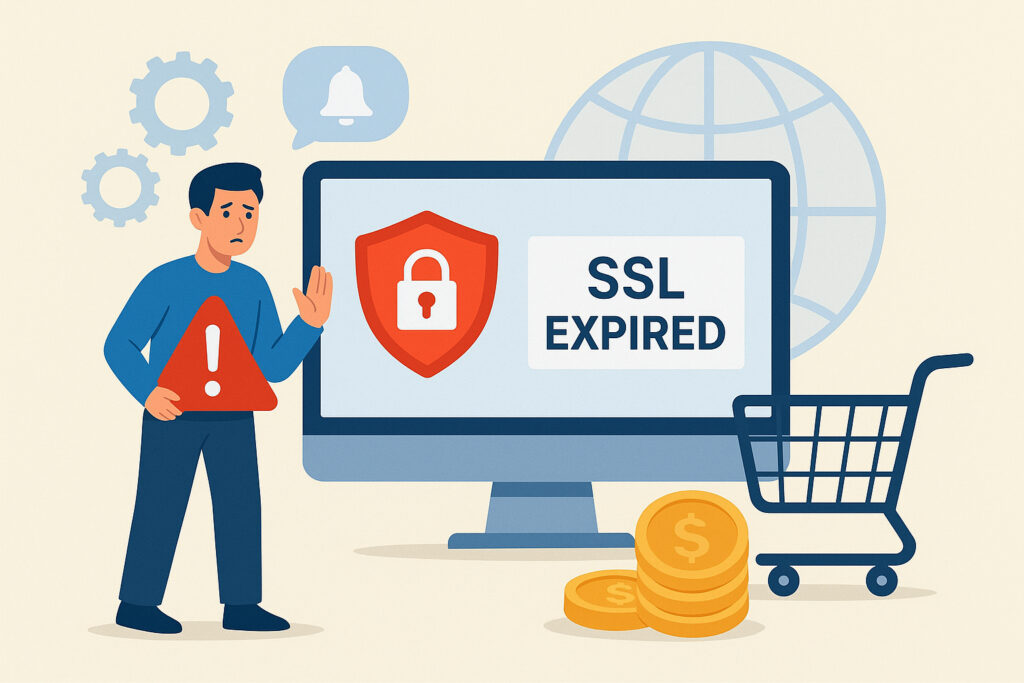If you’re running an e-commerce site, you’ve probably spent countless hours optimizing your conversion funnel, testing checkout flows, and improving product pages. But there’s one overlooked technical detail that can instantly wipe out all that work: an expired SSL certificate. It sounds like a minor IT issue, but the reality is far more damaging than most store owners realize.
When your SSL certificate expires, browsers don’t just show a polite warning. They throw up alarming red screens telling visitors your site is ”Not Secure” or worse, actively blocking access. For an online store, this is the digital equivalent of boarding up your storefront. And unlike other technical problems that might go unnoticed for a while, SSL expiration hits you immediately and completely.
The Immediate Revenue Impact
Let’s talk numbers. When your SSL certificate expires, your sales don’t just dip – they stop. Completely. I’ve seen stores lose anywhere from $5,000 to $50,000 in a single day, depending on their size. One mid-sized retailer I know discovered their certificate had expired on a Friday afternoon. By the time they got it fixed on Monday morning, they’d lost an entire weekend of sales during their busiest season.
But here’s what makes it worse: many visitors who see that security warning won’t come back. They’ll assume your site was hacked or that you’re running a scam operation. First impressions matter, and ”This site is not secure” is about the worst first impression you can make.
The SEO Consequences Nobody Mentions
Search engines don’t just ignore expired certificates – they actively penalize you for them. Google has made HTTPS a ranking signal, which means an expired certificate can tank your search rankings fast. What people don’t realize is that even after you fix the certificate, it can take weeks or months to recover those rankings.
I learned this the hard way a few years back with a smaller project site. The certificate expired over a holiday weekend, and by the time I noticed, Google had already started dropping pages from search results. It took nearly two months to get back to our previous positions, and that was with daily monitoring and active work.
Customer Trust Takes the Biggest Hit
Beyond the immediate technical problems, expired SSL certificates destroy customer trust. Think about it from your customer’s perspective: they’re about to enter their credit card information, and suddenly their browser is screaming that the connection isn’t secure. Even if they understand it’s ”just” an expired certificate, the damage is done.
Trust is especially fragile in e-commerce. Studies show that 84% of shoppers will abandon a purchase if they’re on an unsecured site. And once you lose a customer’s trust, getting them back is nearly impossible. They’ll remember your site as ”that place with security problems” and shop with your competitors instead.
The Support Nightmare
When your certificate expires, your customer support channels explode. Phones start ringing, emails flood in, and your social media gets bombarded with worried customers asking if you’ve been hacked. Each support ticket costs money and time, pulling resources away from actually running your business.
Plus, you’ll need to send out explanatory emails to your entire customer base, which can trigger spam filters and hurt your email deliverability for future campaigns. It’s a cascading problem that affects every channel.
How Long Does It Really Take to Fix?
Here’s a common myth: ”If my certificate expires, I can just renew it in five minutes.” In reality, even if you catch it immediately, you’re looking at 30 minutes to several hours of downtime. You need to generate a new certificate, install it, verify it’s working correctly, and clear any caching issues.
If the expiration happens outside business hours – which it often does – you might be down for an entire day or weekend. And if your team doesn’t have deep technical expertise, you’ll need to wait for your hosting provider or developer to help, adding more delays.
Prevention Is Worth Everything
The solution isn’t just setting a calendar reminder. Certificates can fail for other reasons beyond expiration: renewal processes can fail, auto-renewal systems can break, and certificates can be misconfigured during updates. You need active monitoring that checks your SSL status multiple times per day and alerts you the moment something goes wrong.
Setting up proper monitoring takes less time than recovering from a single certificate expiration incident. The key is getting instant notifications – not discovering the problem when customers start complaining or when you randomly check your site.
Common Questions About SSL Monitoring
How far in advance should I be notified?
At minimum, 30 days before expiration. But I recommend alerts at 30, 14, and 7 days to ensure you don’t miss it.
What if my certificate renews automatically?
Auto-renewal can fail. Always monitor even with auto-renewal enabled, because you need to know immediately if something goes wrong.
Is free SSL monitoring reliable?
Free tools often check only once per day or less frequently, meaning you could be down for hours before discovering the problem. Professional monitoring checks every few minutes.
The Bottom Line
SSL certificate expiration isn’t a minor technical hiccup – it’s a business-critical failure that costs real money, damages your reputation, and drives customers straight to your competitors. The hidden costs go far beyond lost sales during downtime. You’re looking at SEO penalties, customer support costs, damaged trust, and potentially lost customers who never return.
The good news? This is one of the easiest problems to prevent. With proper 24/7 monitoring, you’ll get warned long before any certificate expires, with enough time to renew it calmly during business hours. Your site stays secure, your customers stay happy, and you can focus on actually growing your business instead of fighting technical fires.
